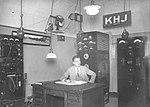Edendale is a historical name for a district in Los Angeles, California, northwest of Downtown Los Angeles, in what is known today as Echo Park, Los Feliz and Silver Lake.
In the opening decades of the 20th century, in the era of silent movies, Edendale was known as the home of most major movie studios on the West Coast. Among its many claims, it was home to the Keystone Kops, and the site of many movie firsts, including Charlie Chaplin's first movie, the first feature-length comedy,
and the first pie-in-the-face. The Edendale movie studios were mostly concentrated in a four-block stretch of Allesandro Street, between Berkeley Avenue and Duane Street. Allesandro Street was later renamed Glendale Boulevard (and a smaller nearby street took on the name Allesandro).
Edendale's hilly streets and nearby lake lent themselves to many silent movie gags. The district's heyday as the center of the motion picture industry was in the 1910s. By the 1920s, the studios had moved elsewhere, mostly to Hollywood, which would come to supplant it as the "movie capital of the world".In the years prior to World War II, Edendale had a large artist community and a large communist community. Many of its residents were transplants from the Eastern United States or the Soviet Union.Edendale was known as such at least until 1940, as the Pacific Electric Railway operated an Edendale Line of its "red cars" that ran the 5-mile (8.0 km) course between Downtown Los Angeles and the top of Edendale. The red car ran down the median of Allesandro Avenue (Glendale Blvd.), which was double-tracked, and even triple-tracked between Sunset and Effie, as the tracks were also used by the interurban Glendale-Burbank Line. After 1940, the Edendale Line as such ceased, though service continued in the form of local service on the Glendale-Burbank Line. Rail service on that line ended completely in 1955, and the tracks have been abandoned. Soon after, the region was cut in two by the construction of the Glendale Freeway.
The name Edendale is no longer used as a place name, and is little known today. A few remnants of the name are the local post office (officially called Edendale Station), a public library branch, an urban farm called Edendale Farm and a restaurant called Edendale. Although many of the structures from the 1910s remain and can be identified by careful comparison with old photos, this district today is located in an unremarkable commercial zone called the "Glendale Boulevard Corridor," which is known mostly for its function as a commuter thoroughfare between the southern end of the Glendale Freeway and downtown Los Angeles. (See vintage and modern site photos.)



